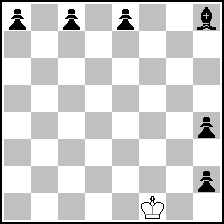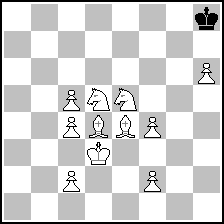
Website founded by
Milan Velimirović
in 2006
0:17 UTC


| |
MatPlus.Net  Forum Forum  General General  Rahmenschach Rahmenschach |
| |
|
|
|
|
You can only view this page!
| | Page: [Previous] [Next] 1 2 | | (1) Posted by Sarah Hornecker [Monday, Oct 15, 2007 12:43]; edited by Sarah Hornecker [07-10-17] | Rahmenschach
In Germany a new kind of fairy stipulation has been created by Andreas Thoma (name by Hanspeter Suwe): Rahmenschach
In Rahmenschach only the fields on the edge of the board (a1 to a8 to h8 to h1 to a1) exist. The hole in the middle can't be overjumped (as it could in Randzüger).
In Popeye the syntax for Rahmenschach problems is "bedi loch b2, b3, b4, b5, b6, b7, c2, c3, c4, c5, c6, c7, d2, d3, d4, d5, d6, d7, e2, e3, e4, e5, e6, e7, f2, f3, f4, f5, f6, f7, g2, g3, g4, g5, g6, g7"
An example (you have to assume b2-b7-g7-g2-b2 doesn't exist):
 (= 1+3 ) (= 1+3 )
h=4
Wandelschach
Rahmenschach
Andreas Thoma
König und Turm no.23, October 2007
1.0-0-0 (Rd8->Q) Ka6 2.Qf8(->B) Kxa7 3.Kd8 Kb8 4.Ke8 Kc8=
Any suggestions on an english word for it? Literally it would be "frame chess".
| | | (2) Posted by [Monday, Oct 15, 2007 13:59] |
'borderline' chess ... ?
It reminds me of some chess problems on a single row (or file)
many years ago. I've forgotten if they had any particular name,
but if that was a kind of 1D chess, this is one of
several possible extensions into some kind of 1.5D chess ...
full 2D naturally being 8x8.
| | | (3) Posted by Hauke Reddmann [Monday, Oct 15, 2007 15:27] |
Chess is not truly 2D since it's discrete.
A real 2D variant might look about this way:
A r-king on (x0,y0) may move to any point (x,y) within the disk (x-x0)^2+(y-y0)^2<=r^2
A @-rook may move to x,y if (x=x0 or y=y0) AND the angle with the (x or y) axis is smaller
than @
A @-bishop (same in diagonal)
Hauke
P.S. First unlucky person to drop the word "fractal"...Oops. Argh.
| | | (4) Posted by Hauke Reddmann [Monday, Oct 15, 2007 15:29] |
Note added in frame:
H. Reddmann, Schach-Report 4129, 2#
 (= 5+2 ) (= 5+2 )
1.Ra6! Ra1 2.Qxa1# - triple frame
| | | (5) Posted by Steven Dowd [Monday, Oct 15, 2007 17:48] |
Well no one has answered my four corner rook question :( but I bet this variant will have a ton of them!
And it certainly must open up a world of possibilities in castling problems.
As to an English term, since we translate Tarrasch's "Springer am Rande bringt Schande" as "Knight on the rim, future is dim" perhaps Rimchess would be the best term? It seems to limit - and this is just at first glance- the number of usable pieces.
A S on b1, for example, can travel only to a3 and back? A B on b1 to a2 and back? A queen becomes a rook with one allowable diagonal move from b1,g1, h8, a8? Does a piece exert power across the board - or since b6, c5, etc. don't exist then a Q on a7 has no diagonal route to g1?
Its certainly interesting.
| | | (6) Posted by Sarah Hornecker [Monday, Oct 15, 2007 18:09]; edited by Sarah Hornecker [07-10-15] |
There is no power across the board. Since b6 etc don't exist one can't move over it.
Andreas Thoma presented 12 problems with castling in his article. I think that's the only thing where it is useful (until proven otherwise).
However, one easily can imagine this funny way to use Rahmenschach:
 (= 1+2 ) (= 1+2 )
SH, Original
#21
Rahmenschach
Anticirce Cheylan
1.Kc8+ Ka7 12.Ke1 Kg1 (zugzwang!) 20.Kh7+ Kf8 21.Kg8#
Note that with Anticirce Calvet it would be a check on move 12, no other difference here.
| | | (7) Posted by Steven Dowd [Monday, Oct 15, 2007 18:42] |
You lost me there. :) To those of us who still haven't figured Circe out yet, antiCirce is a bit of a stretch...... I am only up to 1960 or so in problem chess, give me a year or two before I can comprehend Circe.... if ever.... it might be too late for me.
From what little I do know of fairy chess, there might be a piece or pieces that would "drag" an otherwise impotent piece to a square where it might have use, correct? This would extend it beyond simple castling problems.... or?
| | | (8) Posted by Geoff Foster [Tuesday, Oct 16, 2007 02:05] |
For Popeye the English translation of "bedi loch" is "condition hole". Popeye seems to regard a knight as powerless (it cannot jump over the holes). One fairy condition in which a piece can be dragged around the board is PlatzwechselCirce (PWC), also known as Circe Exchange. When a capture is made in PWC the two pieces exchange places, so the captured piece remains on the board. A pawn on the first rank is utterly powerless. Popeye took 0.046 seconds to solve the following problem.
 (= 1+2 ) (= 1+2 )
series stalemate 91
PWC
Rahmenschach
The white king travels clockwise around the edge (avoiding the corners) and the final 3 moves are 89.Kg8*h7 [+bPg8] 90.Kh7-h6 91.Kh6*h5 [+bPh6]
| | | (9) Posted by Steven Dowd [Tuesday, Oct 16, 2007 12:17] |
Hello Geoff and others!
To illuminate an old duffer like me who has trouble with any fairy chess condition, it seems: *Why* does the king avoid the corners? This might be a "teachable moment" for me....
| | | (10) Posted by Geoff Foster [Tuesday, Oct 16, 2007 13:22] |
The king avoids the corners just to save time. It's quicker to play Kb1-a2 instead of Kb1-a1-a2! The above problem solves itself, but the one below at least has some subtle points.
 (= 1+6 ) (= 1+6 )
series = 150
Platzwechsel Circe
Rahmenschach
11.Ka7-b8 35.Ka7*b8 [+bPa7] 59.Ka7*a8 [+bPa7]!! 84.Ka7*b8 [+bPa7] 150.Kb1-a2 =
The king avoids the corners except on move 59.
| | | (11) Posted by Steven Dowd [Tuesday, Oct 16, 2007 17:49] |
Thanks Geoff... That was easy, I should have seen it... :) (but "should have" seems to be my middle name...)
| | | (12) Posted by Kevin Begley [Wednesday, Oct 17, 2007 00:35] |
Hi all,
I composed the following problem a few years ago, probably before Rahmenschach was invented.
So, this "Rahmenschach-type-idea" is made possible by a combination of Madrasi and PWC.
I did attempt to have it published, but the first editor was not impressed with white's lack of alternatives, and the second, I presume, shared this view, because I never heard a reply. I recently was considering submitting the problem as an original to Mat Plus, but after seeing some of the ideas expressed in this thread, I think this should be its final resting place.
K.Begley
 (= 9+3 ) (= 9+3 )
Madrasi + PWC (Circe Exchange)
sh#384 C+
solution:
1.Kh5
16.K×a7 [+pa6]
39.K×a6 [+pa5]
62.K×a5 [+pa4]
85.K×a4 [+pa3]
108.K×a3 [+pa2]
131.K×a2 [+pb1]
154.K×b1 [+pc1]
177.K×c1 [+pd1]
200.K×d1 [+pe1]
223.K×e1 [+pf1]
246.K×f1 [+pg1]
269.K×g1 [+ph2]
292.K×h2 [+ph3]
315.K×h3 [+ph4]
338.K×h4 [+ph5]
361.K×h5 [+ph6]
384.K×h6 [+ph7] ...h8=R! #
bK makes 16 clockwise revolutions of a 24 point circuit for super-Excelsior (by rebirth) to Rook.
Best Regards,
Kevin Begley.
PS: I was thinking of making this into a clock, which would restart every 16 days.
| | | (13) Posted by Sarah Hornecker [Wednesday, Oct 17, 2007 01:05]; edited by Sarah Hornecker [07-10-17] |
Sadly it's only the fourth longest correct sh# ever but the second longest with orthodox material.
sh# with more than 300 moves:
1. Vaclav Kotesovec (dedicated to Bedrich Formanek for 70th birthday), Pat a Mat 2003, sh#647 (C+)
2. Günter Büsing, Die Schwalbe 1980, 3.hm, sh#424 (C+) - orthodox material
3. Janusz Skrek, Phenix 1992, sh#390
4. Jorge Lois, feenschach 1979, 5.hm, sh#338 (C+)
I think Skrek partially anticipates your sh#384 which is still an improvement over Lois. However, there is something strange, the solution is given at move 380, the stipulation at 390 so please can someone check it? I count 390 moves (16x24+6).
 (= 5+3 ) (= 5+3 )
Janusz Skrek, Phenix 1992, sh#390
Circe exchange (PWC)
Rex Multiplex
390. Kxa6 (wPa7) a8Q#
 (= 11+1 ) (= 11+1 )
Jorge Lois, feenschach 1979, 5.hm, sh#338
Circe exchange (PWC)
338. Kxa6 (wPa7) a8Q#
You should start with bKc8 for a sh#390 which would make Skrek's solution but with orthodox material. :-)
| | | (14) Posted by Kevin Begley [Wednesday, Oct 17, 2007 02:49] |
Thankyou for showing the anticipation!
I Didn't realize this had been done, but I am not surprised.
Yes, this was C+ at sh#390, but I thought better to show bK begin & end on the same square. My inspiration was to make a clock, rather than set a record in fairy chess (do people really keep records with respect to fairy chess problems?).
I am actually amazed that this problem would be in the top 20 for fairy series movers.
And the present record, in my opinion, looks quite vulnerable.
Best regards,
Kevin.
| | | (15) Posted by Kevin Begley [Wednesday, Oct 17, 2007 02:50]; edited by Kevin Begley [07-10-17] |
sorry for the extra post, my network went a little crazy on me.
| | | (16) Posted by Kevin Begley [Wednesday, Oct 17, 2007 02:50]; edited by Kevin Begley [07-10-17] |
when it rains, it pours.
| | | (17) Posted by Kevin Begley [Wednesday, Oct 17, 2007 02:50]; edited by Kevin Begley [07-10-17] |
sheesh.
| | | (18) Posted by Kevin Begley [Wednesday, Oct 17, 2007 02:50]; edited by Kevin Begley [07-10-17] |
error in this post, how do you delete accidental posts?
| | | (19) Posted by Kevin Begley [Wednesday, Oct 17, 2007 02:50]; edited by Kevin Begley [07-10-17] |
Is there a way to delete accidental posts?
| | | (20) Posted by Sarah Hornecker [Wednesday, Oct 17, 2007 04:17]; edited by Sarah Hornecker [07-10-17] |
There are only 13 seriesmovers with 300+ moves.
The record is with taboo pieces Anticircé diagramme on a 12x12 board. I can't give a diagram, only FEN:
rrrrrrrnrrrr/rnnnnnrrrnnr/rnrrrrnnnrrr/rnrnnrrnnrnn/rnrrnnrrnrrn/rrnrrnnrrnrr/nrrnr1nnrrnr/nnrnnr1Rnrrr/rrrnnnnn1nnn/rnnnrrrnr1rr/rnrrrnrrrnrr/rrrnr1rnnK1k
Philippe Rouzaud (dedicated to L. Riguet)
Phenix 2004 (version)
Anticircé diagramme
Taboo pieces (all knights)
sd#2004
Obviously this problem was built for exact that number of moves, else he could've gained some more moves by setting a few more rooks. However, with this kind of problem an infinite number of moves is possible even on a 1-dimensional board (size:1xn)
wRa1 bSa2,a3,a4,a5,... (to n-4) bKa(n-2) wKa(n)
sd#(n-5)
Erich Bartel's sd#1953 of 1973 uses "Echternacher Prozession" (x steps forward, y steps back) at 32/31 to raise moves so I won't regard it as a real record.
This leaves us with 11 real problems, starting at 647 moves. Two are incorrect, leaving us with nine.
-----
To delete the posts, ask MV (Milan Velimirovic). Just send note to MiVel or Admin
| |
Read more... | Page: [Previous] [Next] 1 2
MatPlus.Net  Forum Forum  General General  Rahmenschach Rahmenschach |
|
|
|
 ISC 2024
ISC 2024 Forum
Forum  General
General  Rahmenschach
Rahmenschach 


